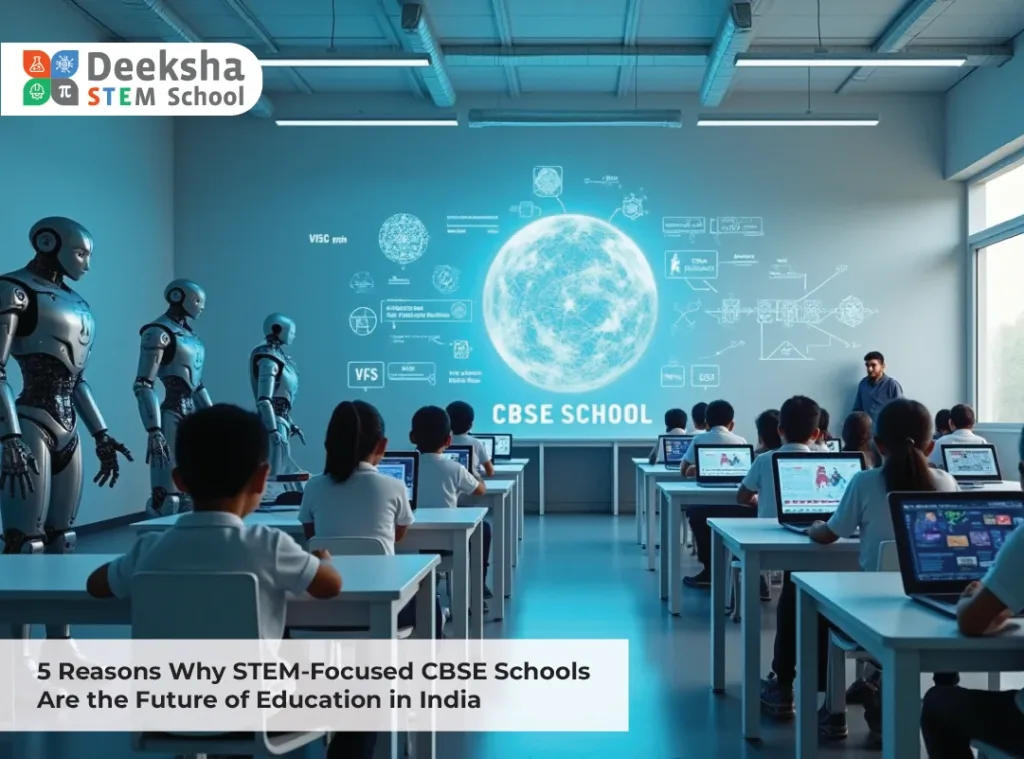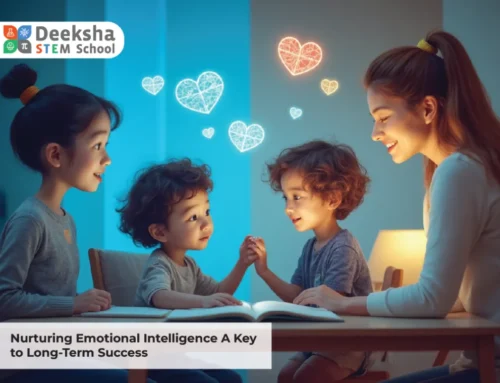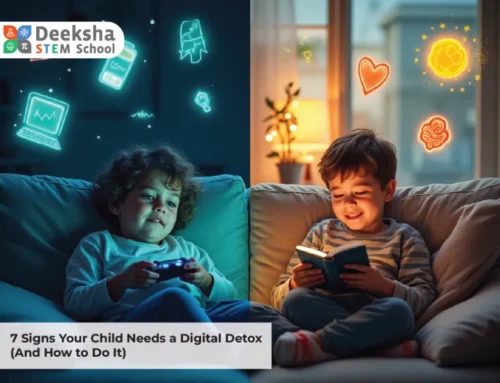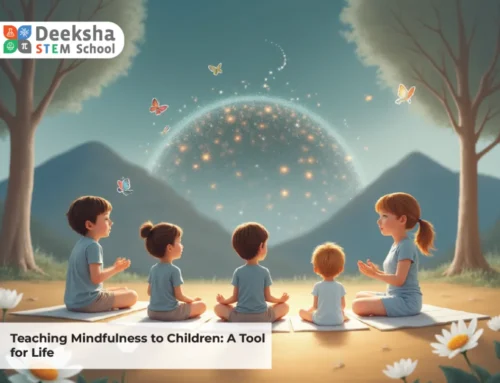The landscape of education in India is undergoing a significant transformation as technological innovation reshapes industries, economies, and global job markets. As automation, artificial intelligence, and data-driven technologies continue to redefine the future of work, the demand for individuals with expertise in Science, Technology, Engineering, and Mathematics (STEM) is growing rapidly. This shift has made it essential for educational institutions to adapt and prepare students for a technology-centric economy.
The CBSE curriculum, renowned for its structured and holistic approach to learning, offers an ideal foundation for integrating STEM education. By encouraging analytical thinking, creativity, and problem-solving, CBSE schools prepare students for the ever-evolving challenges of the modern world. Deeksha STEM Schools are leading this educational revolution by combining the best of the CBSE syllabus with an immersive, hands-on STEM learning approach. Our goal is to empower students with future-ready skills that will enable them to thrive in a technology-driven global economy.
Here are 5 reasons why STEM-focused CBSE schools are the future of education in India and how Deeksha STEM Schools are setting the benchmark for academic excellence and technological innovation.
1. Bridging Academic Knowledge with Real-World Applications
In traditional education systems, there is often a significant gap between theoretical learning and real-world applications. However, today’s workforce demands individuals who can seamlessly translate academic concepts into practical solutions. A STEM-focused CBSE school bridges this gap by:
- Integrating Theory with Practical Application: Concepts from mathematics, science, and technology are connected with real-world challenges, encouraging students to apply what they learn in meaningful ways.
- Hands-On Learning Projects: Students engage in real-world assignments such as developing apps, conducting scientific experiments, and building engineering models, which nurture creativity and innovation.
- Problem-Solving Mindset: The curriculum fosters analytical reasoning and encourages students to approach challenges by breaking them down into smaller, manageable tasks while developing effective solutions.
This approach ensures students are prepared for careers that require practical expertise, adaptability, and innovative thinking.
2. Future-Ready Skills Development for Emerging Careers
With advancements in artificial intelligence, biotechnology, robotics, and data science, future careers will demand a robust mix of technical and soft skills. STEM-focused CBSE schools nurture these essential competencies by:
- Technical Skill Development: Providing early exposure to coding, robotics, AI, and research, which prepares students for careers in technology-focused fields.
- Critical Thinking and Analytical Reasoning: Encouraging students to think logically and evaluate problems from multiple angles through the use of higher-order thinking questions (HOTs).
- Creativity and Innovation Encouragement: Activities like engineering design challenges and science exhibitions inspire students to think creatively and innovate practical solutions.
- Digital Literacy: Equipping students with digital skills, including coding, data analysis, and technological fluency, making them proficient in using digital tools essential for modern workplaces.
This focus on future-ready skills ensures students are equipped for the demands of tomorrow’s dynamic job market.
3. Promoting Research, Innovation, and Scientific Inquiry
Innovation and scientific research form the backbone of technological progress. STEM-focused CBSE schools instill a research-driven mindset in students through:
- Hands-On Scientific Experiments: Encouraging curiosity through regular laboratory work, interactive science fairs, and practical experiments that help students explore concepts more deeply.
- Innovation Labs and Maker Spaces: Dedicated spaces where students can experiment with 3D printing, build robotics models, and engage in engineering projects that foster creativity and collaboration.
- Collaborative Problem-Solving Platforms: Engaging students in group challenges, coding hackathons, and team competitions designed to simulate real-world problem-solving environments.
- Research-Based Assignments: Students are motivated to investigate contemporary issues and propose innovative solutions through in-depth research projects.
This focus on research and scientific inquiry prepares students for advanced careers in engineering, scientific research, and technology development.
4. Global Competitiveness and Exposure
In an increasingly interconnected world, students must develop global perspectives to remain competitive. STEM-focused CBSE schools foster global awareness and competitiveness through:
- Participation in International Competitions: Encouraging involvement in global platforms such as mathematics, science, and robotics Olympiads, which develop problem-solving and creative thinking skills.
- International Exchange Programs: Collaborations with global educational institutions offer students opportunities to engage with diverse cultures and gain global exposure.
- Industry Collaborations: Strategic partnerships with leading tech companies and research organizations provide students with real-world exposure, internships, and mentorship opportunities.
- Global Curriculum Alignment: Adopting international best practices ensures that students are prepared for higher education and career opportunities across global academic institutions.
This emphasis on global exposure equips students with the skills and confidence needed to excel in international academic and professional settings.
5. Fostering Holistic Growth Through Integrated Learning
STEM education goes beyond technical knowledge by promoting holistic personal development. STEM-focused CBSE schools emphasize emotional intelligence, leadership, and social responsibility through:
- Leadership Training Programs: Encouraging participation in leadership workshops, debates, and public speaking to nurture decision-making and interpersonal skills.
- Emotional and Social Development: Activities designed to enhance self-awareness, empathy, teamwork, and communication skills to prepare students for collaborative work environments.
- Community Outreach and Civic Responsibility: Encouraging students to engage in social initiatives that apply STEM solutions to address community challenges, promoting social responsibility.
- Creative Integration through STEAM: By combining arts with STEM education (STEAM), students are encouraged to approach problem-solving creatively, enhancing their innovation potential.
This comprehensive educational approach ensures students are equipped for academic success and are prepared to become responsible, globally-minded citizens.
Conclusion
The integration of STEM education with the CBSE curriculum is shaping the future of education in India. By merging traditional academic rigor with practical, hands-on learning experiences, STEM-focused CBSE schools like Deeksha STEM Schools empower students to thrive in an increasingly competitive, technology-driven world.
At Deeksha STEM Schools, our mission is to prepare students for success by fostering innovation, critical thinking, creativity, and global awareness. We equip students with the knowledge, skills, and mindset required to excel in fields such as technology, science, engineering, and research. If you are seeking an educational institution that prepares your child for future success through a combination of academic excellence and cutting-edge STEM education, Deeksha STEM Schools is your ideal choice. Contact us today to learn how we can help shape your child’s future and unlock their full potential.






Leave A Comment